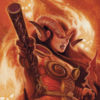Today, we are talking about warlocks. I am using the word warlock because any concept needs a name, and this one has been used for this purpose even if people debate its general origin or full meaning.
In the history of human mystical, spiritual, or magickal traditions (it can be hard to draw any substantial line between these) there have always been complications. Tradition doesn’t always produce the desired results when training a new student of the spirit world.
The world’s oldest spiritual traditions on the planet can all be connected into what we now call shamanism. Other traditions came later in history taking on different practices and world views or paradigms, and leading to different insights about the world in general, both the natural world and the human world. But as I said earlier, not every student turns out how their teachers would intend. Spiritual discipline is necessary no matter what path you follow or what gifts you might seek to develop. The wise men and women known in some European cultures, and witches, had a long standing oral tradition and expected to produce midwives, medicine people and seers. Male witches had more or less the same training as females did, but due to temperament and talent they most often fell into different specializations.
Was it always seen as an evil thing to be a witch then? Originally no, not at all. The village witches were once quite highly respected.
So you are using warlock to mean male witches? I am not. Male witches tended to observe omens and devote themselves to the keeping of stories that held the philosophy and natural insight of their people.
Males can just be witches, but I’ve never heard of a lady warlock. They would be rare, but have existed. The prophet Merlin would have been an example of a male witch rather than wizard. In fact, the druids would have more directly contributed to the tradition of the witches than to the Norse hermit mystics that were wizards classically.
Witches can shape shift, wizards don’t? Ah, wizards tended to specialize in fate bending which Merlin himself was not known for. Fate bending is also known as siedh, a practice taken up by Norse women and some men.
The warlock is always something of an accident. In the tradition of witches, there are many warnings about dealings with the spirits. They revere nature and they acknowledge that spirits have their respective places in it, but things like fairies, vampires, and things like that, were to be avoided for the most part, and if you couldn’t avoid them then you use magick to strike some sort of protective balance with them.
Even a witches view of the gods they worshipped was not the same as a priest. To a witch, the gods were the grand matriarchs and patriarchs of all of natural reality. They were benign and worthy of love and devotion for the same reason an honorable elder might be, and not because they were going to punish you if you did not, or if you did not obey their laws. It was believed that the gods of the witches provided guidance and protection through insights arrived at through omen reading and dream interpretation.
Warlocks occurred by virtue of a sort of spiritual contagion, and have occurred all across the world and in every culture. One possible origin for the word warlock was the term varo-lokkur, meant caller of spirits. Warlocks occurred even before the venerable tradition of witches ever gave rise to any. Shaman apprentices could turn down such a path.
Your thoughts are welcome. Be well friends.
Travis Saunders
Dragon Intuitive
~science,mysticism,spirituality~



Leave a Reply